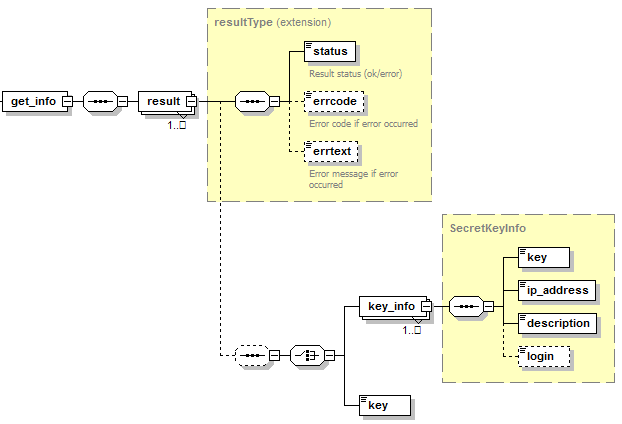Retrieving Information on Secret Keys
To retrieve information on secret keys located on the server, use the get_info operation.
Note: For security reasons, the get_info operation does not show secret keys themselves. It shows only additional information (for example, the secret key ID).
Request Packet Structure
A request XML packet that retrieves information on secret keys includes the get_info operation node:
<packet>
<secret_key>
<get_info>
...
</get_info>
</secret_key>
</packet>
The get_info node has the following graphical representation:

Note: The interactive schema navigator for all request packets is available here: http://plesk.github.io/api-schemas/1.6.9.1/agent_input.svg.
- The filter node is required. It specifies the filtering rule.
To retrieve information on all secret keys located on the server, use the blank
filter node (
<filter/>). Data type: complex. - The key node is optional. To retrieve information on the desired secret key, specify its value or ID for this node. Data type: string.
Remarks
You can retrieve information on multiple secret keys in a single request. To do so, add as many key parameters to filter as many secret keys you have whose information you want to retrieve.
<filter>
<key>...</key>
...
<key>...</key>
</filter>
Response Packet Structure
The get_info node of the response XML packet is structured as follows:

Note: The interactive schema navigator for all response packets is available here: http://plesk.github.io/api-schemas/1.6.9.1/agent_output.svg.
-
The result node is required. It wraps the response retrieved from the server. Data type: resultType (
common.xsd). -
The status node is required. It specifies the execution status of the get_info operation. Data type: string. Allowed values: ok | error.
-
The errcode node is optional. Is returns an error code if the get_info operation fails. Data type: integer.
-
The errtext node is optional. It returns an error message if the get_info operation fails. Data type: string.
-
The key node is optional. It holds the secret key value if the operation fails. Data type: string.
-
The key_info node is optional. It holds information on the secret key if the operation succeeds. Data type: SecretKeyInfo (
plesk_secretkeys.xsd).The following parameters are nested in the key_info node:
- The key node is required. It holds the secret key ID. Data type: integer.
- The ip_address node is required. It holds the IP address
assigned to the secret key. Data type: ip_address (
common.xsd). - The description node is required. It holds the secret key description. Data type: string.
- The login node is required. It holds the login name of the Plesk customer or reseller the secret key was assigned to. If you did not specify any login name creating the secret key, the node will contain the administrator login name. Data type: string.
Retrieving Information on a Secret Key
The following request retrieves information on the secret key
ff4464d9-468d-3664-26bb-c87606941502:
<packet>
<secret_key>
<get_info>
<filter>
<key>ff4464d9-468d-3664-26bb-c87606941502</key>
</filter>
</get_info>
</secret_key>
</packet>
Response:
<packet>
<secret_key>
<get_info>
<result>
<status>ok</status>
<key_info>
<key>17</key>
<ip_address>192.0.2.1</ip_address>
<description/>
<login>admin</login>
</key_info>
</result>
</get_info>
</secret_key>
</packet>
If the secret key was not found on the server, the response will look as follows:
<packet>
<secret_key>
<get_info>
<result>
<status>error</status>
<errcode>1013</errcode>
<errtext>Key is not found</errtext>
<key>ff4464d9-468d-3664-26bb-c87606941502</key>
</result>
</get_info>
</secret_key>
</packet>
Retrieving Information on Multiple Secret Keys
The following request retrieves information on the secret keys
0a45eb21-a9e7-4051-9ae8-a8f5d996874e and 42287e35-cd85-da41-f4f5-cc5f0aee4aaa:
<packet>
<secret_key>
<get_info>
<filter>
<key>0a45eb21-a9e7-4051-9ae8-a8f5d996874e</key>
<key>42287e35-cd85-da41-f4f5-cc5f0aee4aaa</key>
</filter>
</get_info>
</secret_key>
</packet>
Response:
<packet>
<secret_key>
<get_info>
<result>
<status>ok</status>
<key_info>
<key>18</key>
<ip_address>192.0.2.1</ip_address>
<description/>
<login>user1</login>
</key_info>
</result>
<result>
<status>ok</status>
<key_info>
<key>19</key>
<ip_address>192.0.2.1</ip_address>
<description/>
<login>user2</login>
</key_info>
</result>
</get_info>
</secret_key>
</packet>
Retrieving Information on All Secret Keys
The following request retrieves information on all secret keys located on the server:
<packet>
<secret_key>
<get_info>
<filter>
</filter>
</get_info>
</secret_key>
</packet>
Response:
<packet>
<secret_key>
<get_info>
<result>
<status>ok</status>
<key_info>
<key>5</key>
<ip_address>192.0.2.1</ip_address>
<description/>
<login>admin</login>
</key_info>
</result>
<result>
<status>ok</status>
<key_info>
<key>6</key>
<ip_address>192.0.2.1</ip_address>
<description/>
<login>customer</login>
</key_info>
</result>
</get_info>
</secret_key>
</packet>